Ol' Pals
What Were Their Names?
James K. Moran
Reuben James
I decided to treat myself to begin 2009 by doing a weekend videos on my all-time favorite Kingston Trio song (and BTW on Nick Reynolds' short list for the same, he identifying "Flowers" and "Hobo's Lullaby" also -- but heck -- his dad was a Captain in the Navy, for goodness' sakes!). Plus -- we have some great video versions to see and hear.
We all know the basic story behind the song because we all know the song -- brave American sailors on North Atlantic patrol, the U-Boat attack, the few survivors, Woody Guthrie, the "Wildwood Flower" tune, the song.
But there's more -- much more.
To start, Reuben James himself was apparently one hellaciously forceful figure -- an boatswain's mate who distinguished himself in the very early USN in the two wars against the Barbary or Tripoli pirates (1803 and 1815) and in the War of 1812, serving in all three under Lieut., Capt., then Commodore Stephen Decatur. In the first pirate war, James was one of four sailors whom Decatur took under cover of darkness to burn a captured American warship in Tripoli harbor, an exploit praised as the most daring in naval warfare at the time by no less than Britain's legendary Admiral Lord Nelson. James also is credited with saving Decatur's life on at least two occasions, the first in the Battle of Tripoli when despite bleeding from wounds in both hands he threw his body over Decatur's prostrate form and took a scimitar slash for him -- then got up and killed the assailant and went on fighting. He served more than thirty years in the USN, retiring in 1836 at 57 due to ill health from his many combat wounds.
I'd say that this was a sailor worthy of the three ships named in his honor, the first of which, DD-245, commissioned in 1919, is the subject of our song.
But as I noted in my WV (weekend videos) on "Remember The Alamo," we tend to remember the myths more than the often-ambiguous underlying realities of history. Such is the case with the USS Reuben James. The actual events of late October 30th and early October 31st 1941 are surrounded in a haze of mystery and likely lost forever beneath the murky North Atlantic waters.
The destroyer was on convoy patrol escorting cargo ships to the UK, part of FDR's Lend-Lease program -- regarded by many experts in international law today as an act of war, making the Reuben James a fair target for the German navy. As a sub-hunting destroyer, the James tracked the approach of a U-Boat "wolfpack" and steamed in its direction. What is not clear to this day is a)whether or not the ship that Reuben James was immediately protecting actually was carrying war materiel (as the Germans alleged, the Allies denied, and today seems likely but not certainly established); b) whether the U-552 under Capt Erich Topp (who died at 91 on Dec. 26th just three years ago!) was actively engaging the Reuben James or was firing at the presumed ammunition ship and hit RJ incidentally; and c) whether the rapid sinking and high loss of life aboard the destroyer was caused by the torpedo hitting the forward magazine, or whether the impact explosion set off the destroyer's depth charges stored right below the main deck.
I have never been completely satisfied as to why this did not lead to an immediate declaration of war against Germany -- it is, after all, exactly what the Japanese did at Pearl six weeks later. I'm guessing -- and check out the article at the end of our first video -- that the FDR people realized that they were on shaky legal ground to begin with in using the US military to aid and abet an active combatant nation in war time.
In any event, it was a major national shock at the time, and oddly little remembered outside of the song today. Woody Guthrie, like his fellow Almanac Singers (including Pete Seeger and Bess Lomax, daughter of folklorist John A. and who would go on to co-write "MTA"), switched from opposing US intervention in WWII to favoring it after Hitler betrayed his pact with Stalin and attacked Russia in late summer of '41. Guthrie joined the Merchant Marine with close friend and folk legend-to-be Cisco Houston, shipping together on a number of transports (two of which were torpedoed and sunk, Cisco later remarking that when the ship "didn't sink too fast" he'd get out his guitar and sing the RJ song with Woody and the crew waiting for the lifeboats to deploy).
Woody originally intended to mention each of the 86 sailors who died on the Reuben James by name -- one of his early drafts included this:
What Were Their names?There's Harold Hammer Beasley, a first rate man at sea From Hinton, West Virginia, he had his first degree. There's Jim Franklin Benson, a good machinist's mate Come up from North Carolina, to sail the Reuben James. Dennis Howard Daniel, Glen Jones and Howard Vore Hartwell Byrd and Raymond Cook, Ed Musselwhite and more Remember Leonard Keever, Gene Evans and Donald Kapp Who gave their all to fight about this famous fighting ship.
The other Almanacs (John Birchler identifies Pete Seeger) told Woody that no one would ever sing a song so long, so Guthrie cut it to four verses, adding the chorus "What were their names?" at the suggestion of Almanac Millard Lampell to keep the focus on the sailors themselves and not the incident only. The original last verse, a war-time rallying cry, went:
Now tonight there are lights in our country so bright In the farms and in the cities they're telling of the fight. And now our mighty battleships will steam the bounding main And remember the name of that good Reuben James.
The last verse we know was added after the war with Woody's blessing by Weaver Fred Hellerman (who wanted the song to be timeless rather than specific to one war), and that group has a fine and dramatic performance of the song on one of the Carneige Hall concert albums.
Most of us and much of the folk world only learned of this marvelous song, though, in the Kingston Trio's 1961 Close Up album -- this is I think the definitive version of the song. This fine video includes the names of all of the dead from the Reuben James -
What an extraordinary performance! Perhaps in the shadow and under the influence of Goin' Places and their treatment of Guthrie's "This Land" -- the Trio manages to be powerful at a very moderate pace, unlike the breakneck speed at which some other groups sang both songs. This would include the selfsame NBJ trio in the mid and late 60s concerts at which I saw them, and here in the 1981 reunion (which truncates a verse, dammit!):
And Trio fans have to be delighted that our current Trio of George, Bill, and Rick have chosen to include this KT classic in their performing repertoire. It seems to me that they split the difference between the two NBJ videos in terms of pace while retaining the power of the original, and George dramatically re-imagines the banjo part:
Only one other major folk group that I know of even dared to try to match the Kingstons on this song, and that was the Chad Mitchell Trio three years after the KT on their wonderful album Reflecting. Paul Prestopino and Jacob Ander provide ample support for this fine but different version of the song, a bit more like the Weavers:
A fine memorial and a wonderful song. The KT IMHO never sounded better.
More Videos
First, a million thanks to Xroader/Bloodliner/FC Camper/Swede-living-in-Mallorca Bo Wennstam for taking and posting the video of the GBR trio doing the song last August -- I ran out of space for acknowledgments on the first post.
Now, while I have no video available of Woody Guthrie doing the song himself, there are two versions on YouTube that come close. First -- Aussie Raymond Crooke, living in Hong Kong and a member of the HK Folklore society, poster of hundreds of folk videos to YouTube, comes closest to Woody's version on guitar and vocals -- this video has an extraordinary 42,000 views:
My occasional YT correspondent Alonso Garbanzo performs the song as Guthrie would have -- if Woody had been able to sing and play better than he did!
Finally, an extraordinary seven minute re-telling of the story in pictures, text, and a wonderful use of gaming software to create an accurate reproduction of the ship itself (four stacks and all) and the combat:
Photos
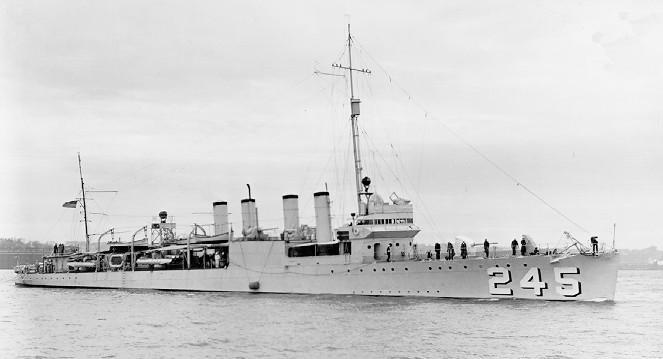
The USS Reuben James
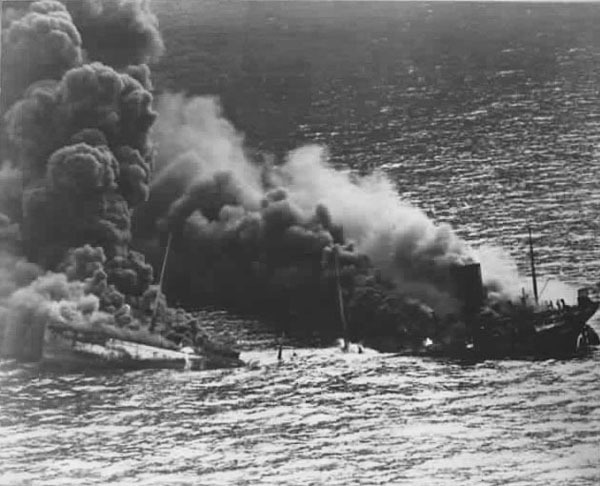
The Actual Sinking
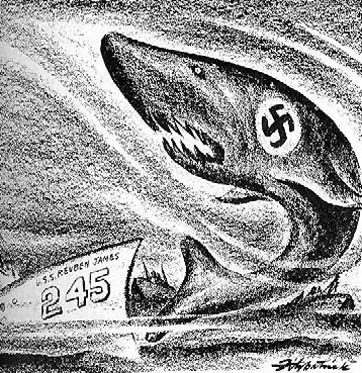
Editorial Cartoon About The Incident
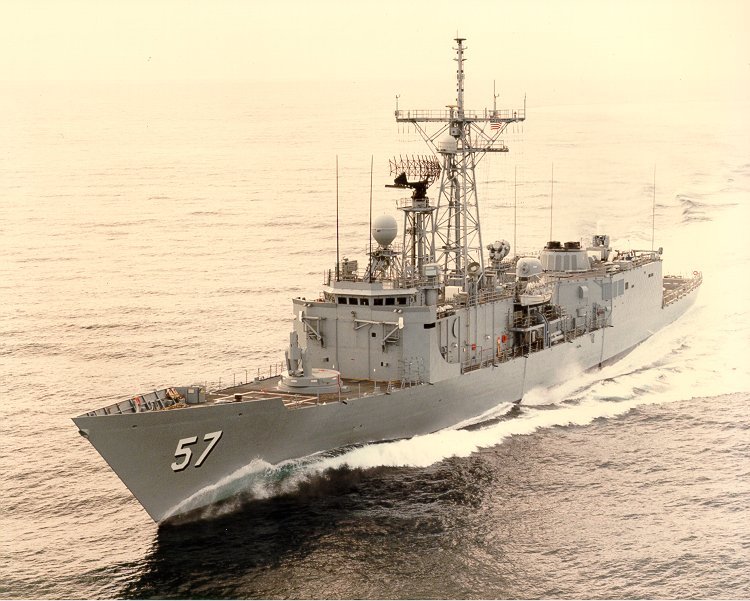
Today's USN Frigate Reuben James
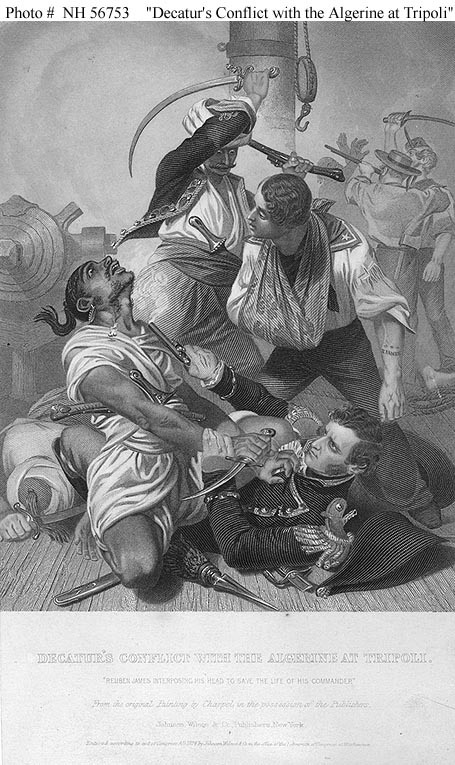
Reuben James Saving Stephen Decatur
A Final Comment
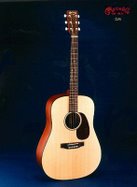 From the notes by "ondeafears.com," the poster on YT who uploaded the RJ video with the KT and all the names:
From the notes by "ondeafears.com," the poster on YT who uploaded the RJ video with the KT and all the names:
This version is by the Kingston Trio. Some folk music fans do not like the Kingston Trio, quite possibly simply a backlash against the massive popularity they enjoyed in the late 1950s to mid-1960s. I'm no expert on folk and no purist -- all I know is that they sing great together and that there is a lot of power in those guitars and vocals. "Reuben James" sounds great.
I threw this one together myself. The song famously asks, "What were their names?" I've answered that question.
Amen to that. Happy New Year!
Taken, with permission, from: http://compvid101.blogspot.com/2009/01/what-were-their-names-woody-guthries.html While we disagree on "definitive versions", we appreciate his labor! Thanks, Jim.
See Cisco's version of the song, and the complete lyrics, Here
We welcome any suggestions, contributions, or questions. You send it, we'll consider using it. Help us spread the word. And the music. And thanks for visiting.

